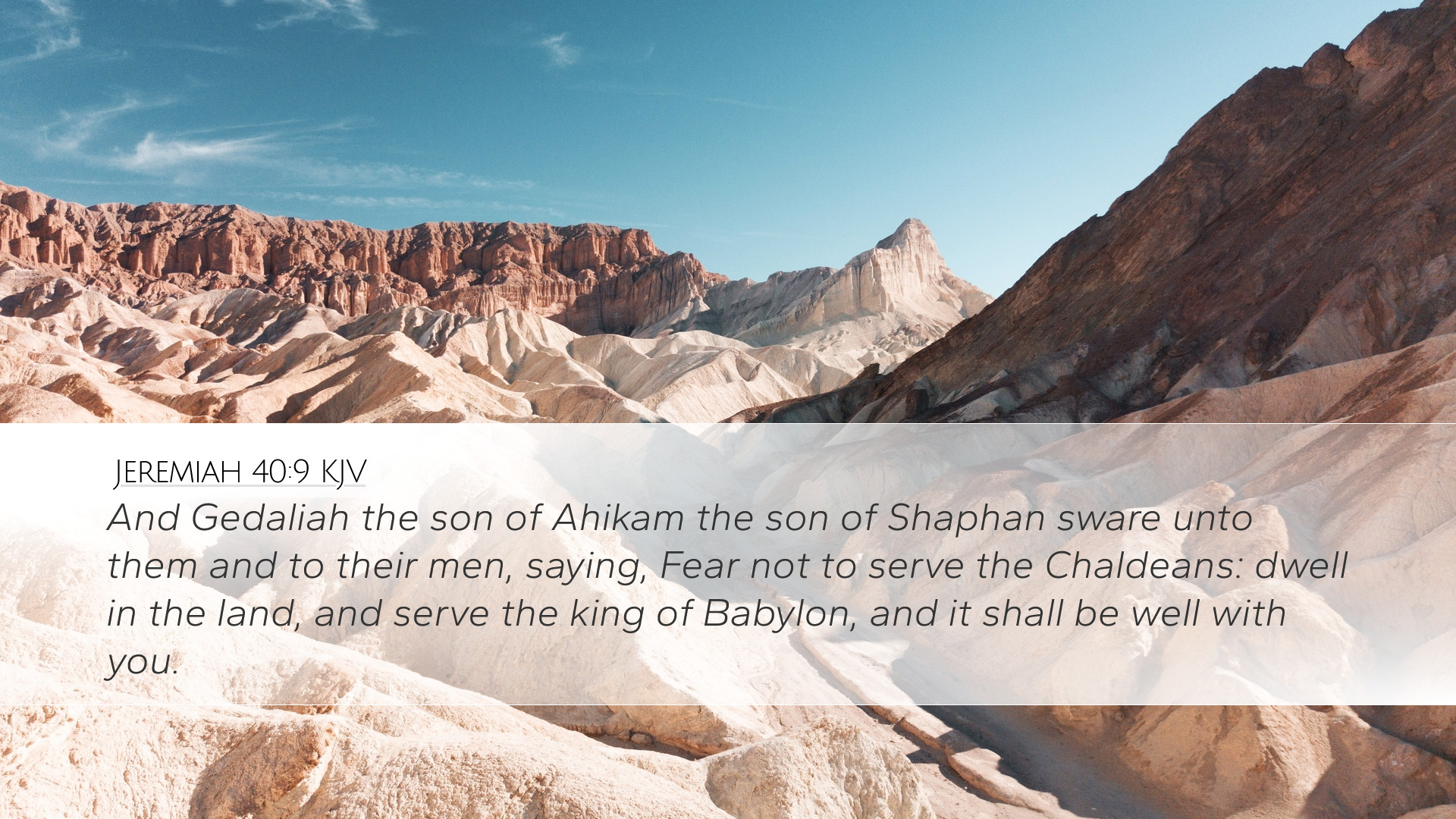Jeremiah 40:9 - Commentary Overview
Verse Reference: Jeremiah 40:9 (KJV) - "And Gedaliah the son of Achikam the son of Shaphan swear unto them, and to their men, saying, Fear not to serve the Chaldeans: dwell in the land, and serve the king of Babylon, and it shall be well with you."
Introduction
This verse captures a pivotal moment in the aftermath of Jerusalem's fall, as Gedaliah steps forward to provide leadership among the remnant of the people left behind. There is significant insight to be gained from this passage as it relates to themes of leadership, obedience, and the sovereignty of God amidst judgment.
The Context of Gedaliah's Leadership
The historical context is essential in understanding this verse. After the conquest of Jerusalem by the Babylonians, there was a great void in leadership among the Jewish exiles. Gedaliah, appointed by Nebuchadnezzar, serves as governor over those who remained. The Public Domain Commentaries highlight several crucial aspects:
- Matthew Henry: Gedaliah represents a remnant's hope. His assurance that "it shall be well with you" indicates a divine promise amid despair, showing God's continued concern for His people.
- Albert Barnes: The mention of "serving the Chaldeans" requires understanding that this servitude was not merely physical but also spiritual. It reflects God's decree and the people's need for obedience to His will.
- Adam Clarke: Clarke emphasizes that Gedaliah's leadership was a test of faith for the people, pressing them to trust in God's providence despite their circumstances.
Gedaliah's Call to Courage
The phrase "Fear not to serve the Chaldeans" offers rich theological implications regarding fear and faith.
- Analysis of Fear: Gedaliah's exhortation to not fear is rooted in the context of upheaval. The Babylonians were perceived as oppressors, and to serve them could seem daunting. Yet, he encourages the people by highlighting God's sovereignty.
- Theological Implication: This reflects a broader biblical motif where God's people are often called to remain steadfast amid trials. The commentary suggests a comparison to the call made to Israel during their wilderness wanderings.
- Moral Duty: Gedaliah's message stresses the moral obligation to remain in the land and fulfill the roles appointed to them, which signifies an active faith even in times of desolation.
The Promise of Well-Being
Gedaliah’s promise that it shall be well with you is pivotal. The assurance serves as a reminder of God's providential care which would lead to restoration. Perspectives from the commentaries highlight:
- Social Stability: By encouraging the people to settle and serve, Gedaliah aims to restore social order in a tumultuous time, indicating that obedience brings stability.
- God's Faithfulness: This encouragement acts as a testament to God's faithfulness and mercy towards His children, even after judgment. It evokes a call to trust that there is a divine plan unfolding.
- Community Resilience: The collective adherence to Gedaliah's advice could foster a sense of community and resilience, promoting hope among the remnants.
The Leadership Qualities of Gedaliah
Gedaliah's character and leadership are exemplary for pastors and leaders today, offering valuable lessons in humility and trust in God.
- Servant Leadership: Gedaliah’s approach of reassuring his people demonstrates a servant leader's heart, emphasizing guidance over authoritarian rule.
- Integrity in Leadership: His lineage and position denote credibility, and he takes on a mantle that, while fraught with danger, also brings opportunity for stewardship.
- Wisdom in Advising: The wisdom in his counsel highlights the importance of godly advice during uncertain times, encouraging leaders to seek divine guidance.
Conclusion
In Jeremiah 40:9, we find a brief yet profound narrative that encapsulates the themes of leadership, obedience, and God's enduring promises. Gedaliah's words serve as a bridge connecting the remnants of Israel's past with their uncertain future, encouraging them towards faithfulness in the face of adversity. Understanding this passage prompts pastoral reflection on how leaders can embody courage, deliver encouragement, and point to God's providential care in their ministry contexts.


